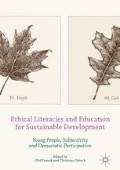Abstract
This chapter investigates what opportunities children have to act as moral subjects within the school context while working with fiction at school. Theoretically, Edmund Husserl (Husserliana. Haag: Nijholt, 1950), Maurice Merleau-Ponty (Phénoménologie de la Perception. Paris: Gallimard, 1945) and George Herbert Mead (Mind, self, and society: From the perspective of a social behaviorist. Chicago: University of Chicago Press, 1934) are important because, by contributing to phenomenological theories of “acts”, they seek to explain in what ways social agents constitute social reality through language (and other symbolic social signs). The idea that discourse creates linguistic structures to construct the self is essential, as well as the concept of identity as unstable and non-coherent; identity is regarded a performative accomplishment, where the act that one “does” (performs) does not start with classroom discourse. To be able to discuss the possibility of acting as moral subjects, fiction focusing on social issues from a variety of positions has been analysed: “Use your language, young man” (by L. Hesslind), “When mum ran away” (by M. Lind) and “From my unknown home country” (by S. Holmström). These texts are all extracts from textbooks that are used in compulsory school, discussing moral standpoints stressed by the curriculum (i.e. equality in terms of gender, ethnicity and social background). Also, in all three of them the reader meets a main character who in the first person retells something that has happened in the past, and by doing so both (re-)presents the book’s content and evokes action denoting performativity. Since the texts are extracts from longer stories, and are presented together with exercises in the textbooks, the results of the analyses of these materials are compared with analyses of the full-length texts. In doing this the opportunities for students to act as social subjects are raised for discussion, as vwell as the constraints of classroom discourse.
Access this chapter
Tax calculation will be finalised at checkout
Purchases are for personal use only
References
Alvåker, L., & Boglind, A. (1994). Bokskåpet [The bookcase]. Malmö: Gleerups.
Austin, J. L. (1975). How to do things with words. Oxford: Oxford University Press.
Bach, K. (1994). Thought and reference. New York: Oxford University Press.
de Beauvoir, S. (1982). The second sex. London: Harmondsworth.
Falkenland, R. (1998). All världens berättelser och du [All stories of the world and you]. Stockholm: Natur och Kultur.
Hazard, P. (1947). Books, children and men. Boston: Hornbuck.
Hellsing, L. (1963 [1999]). Tankar om barnlitteraturen [Thoughts on children’s literature]. Stockholm: Rabén & Sjögren.
Hussserl, E. (1950). Husserliana. Gesammelte Werke. Haag: Nijholt.
Lindberger, Ö. (1998). Barnböcker och vuxenlitteratur. In K. Hallberg (Ed.), Läs mig – sluka mig! En bok om barnböcker [Read me – Swallow me! A book on children’s literature] (pp. 19–32). Stockholm: Natur och Kultur.
Mead, G. H. (1934). Mind, self, and society: From the perspective of a social behaviorist. Chicago: University of Chicago Press.
Merleau-Ponty, M. (1945). Phénoménologie de la Perception. Paris: Gallimard.
Rose, J. (1992). The case of Peter Pan or the impossibility of children’s fiction. London: Macmillan.
Sjöbeck, K., & Holmström, F. (1999). Svenska nu [Swedish now]. Stockholm: Liber.
Skolverket. (2011). Läroplan för grundskolan, förskoleklassen och fritidshemmet 2011 [Curriculum for the compulsory school, preschool class and the recreation centre 2011]. Stockholm: Skolverket.
Topelius, Z. (1865). Läsning för barn [Reading for children]. Stockholm: Bonniers.
Wernström, S. (1991). Ös böcker över barnen! In T. Karnstedt (Ed.), Läsfeber. Om läsandets lust och vånda [Reading fever. On reading for pleasure and Anguish] (pp. 163–168). Stockholm: Litteraturfrämjandet.
Author information
Authors and Affiliations
Editor information
Editors and Affiliations
Rights and permissions
Copyright information
© 2017 The Author(s)
About this chapter
Cite this chapter
Lyngfelt, A. (2017). Fiction at School for Educational Purposes: What Opportunities Are Students Given to Act as Moral Subjects?. In: Franck, O., Osbeck, C. (eds) Ethical Literacies and Education for Sustainable Development. Palgrave Macmillan, Cham. https://doi.org/10.1007/978-3-319-49010-6_5
Download citation
DOI: https://doi.org/10.1007/978-3-319-49010-6_5
Published:
Publisher Name: Palgrave Macmillan, Cham
Print ISBN: 978-3-319-49009-0
Online ISBN: 978-3-319-49010-6
eBook Packages: EducationEducation (R0)

